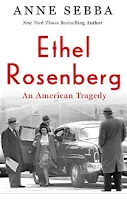June 8, 2021
NetGalley
St Martin’s Press
Biography, nonfiction, digital, arc, historical
320 pages
ISBN: 9781250198631
Macmillan Audio
Narrated by Orlagh Cassidy
6/3/21-6/5/21
4/5
Anne Sebba
Facebook: /anne.sebba
Instagram: @anneseba
Twitter: @annesebba
Website: annesebba.com
St. Martin's Press
Instagram: @StMartinsPress
Twitter: @StMartinsPress
Facebook: @StMartinsPress
Michelle Cashman
Senior Marketing Manager, St. Martin's Press
Michelle.Cashman@stmartins.com
I received a complimentary digital and audio copy of this book from the publisher and NetGalley. This review is my voluntary and unbiased opinion.
From the beginning it seems the author wants to sway readers opinion of Ethel’s innocence. Personally, I think her opinion would have best been presented at the end to let the reader develop her own opinion.
It’s Depression Era in New York where families are living in difficult times. This was true for many Jewish immigrants who experienced poverty. Communism was a common philosophy at the time being challenged by the government. The Greenglass family works hard to make ends meet being immigrants from Russia. Ethel sought the approval of her cold, critical mother, Tessie. Being a good student she graduated at 15 years old but need to find work to help support the family. She had loved the theatre and music and often felt drawn to teaching herself sight reading which eventually led to her performing at Carnegie Hall. Because college or other formal training weren’t possible, she took up transcription classes to find work and help make money to support the family. At that time, she became politically involved in causes to support her communist philosophy.
During this time in history, it was not uncommon to encounter communists in America. Much of the philosophy Ethel seemed focused on pertained to equal rights for workers in developing a union for the small shipping company for which she worked. It was at one of Ethel’s performance that she met Julius Rosenberg who was 21 years old. He was the son of Harry and Sophie Rosenberg who immigrated from Poland. Julius was able to study at CCNY where he learned electrical engineering but was very politically involved.
This story provides the historical data and research regarding the fall out regarding communism and espionage. While Ethel was involved with communist causes in her youth, she abandoned much involvement after she had children. She devoted much of her time and energy on becoming a successful parent. She read and researched extensively on parenting and child psychology. How much or what she knew about her husband’s activities is unknown and more importantly unproven.
It seemed more likely that she was included and executed on circumstantial (that’s a stretch) information. It seems her brother David and his wife Ruth were very involved and when questioned implicated Julius and Ethel to save themselves. Ethel was a strong willed woman who refused to show fear or be disloyal to her husband. In the end, with all appeals exhausted she was put to death. The government was very selective and decisive regarding the execution and who should be killed first. They realized they didn’t have evidence that Ethel was involved just “suspicions.” They wanted to make an example of what could happen if people were found guilty of espionage. They hoped that she would “turn” on her husband but that never happened and the government felt obligated to follow through with the conviction.
After reading the facts of the case, it is clear there was no physical evidence to support the claim that Ethel committed espionage while also taking her children. Ultimately, I think coming to that conclusion in the end would be a better read than feeling that the author was trying to persuade the readers opinion. I enjoy reading author’s opinions and research on cases but usually at the end of a story not the beginning.
Overall, a worthy historical read.


No comments:
Post a Comment